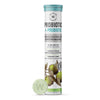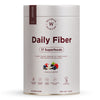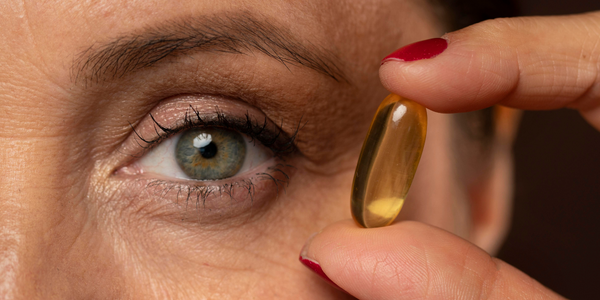Fructooligosaccharides or FOS often classified as prebiotic fiber, are an alternative sweetener. However, unlike sugar, they contain more fiber, fewer calories and are non-digestible, because of which they don’t cause a blood sugar spike. It’s the reason fructooligosaccharides are a better alternative to regular sugar.
But did you know fructooligosaccharides also offer numerous health benefits? If not, read along. This blog talks about 6 interesting health benefits of consuming fructooligosaccharides. In addition, you’ll find a safe way to include fructooligosaccharides in your diet.
What are Fructooligosaccharides?
Fructooligosaccharides, often classified as fiber, are a type of carbohydrates known as oligosaccharides. The term oligosaccharides are multiple molecules made of monosaccharide or simple sugar. So, you can think of fructooligosaccharides as oligosaccharides that come from natural sources such as:
- Garlic
- Blue Agave
- Yacon Root
- Onion
- Jerusalem Artichokes
- Leeks
- Chicory Root
- Bananas
- Asparagus
6 Research-Backed Health Benefits of Fructooligosaccharides (FOS)
1. Prebiotic in Nature
FOS or Fructooligosaccharides are considered to be prebiotics. While you may confuse prebiotics with probiotics, they’re different. Probiotics are live microorganisms thriving in your gut and responsible for maintaining overall health, and prebiotics are non-digestible fiber that act as food for the good / probiotic bacteria to nourish their growth.
As fructooligosaccharides are indigestible, they reach your large intestine and benefit the growth of good bacteria in your digestive tract. Also, fructooligosaccharides are used in baby formula to help grow good bacteria in your intestines.
2. Help Deal with Harmful Bacteria
Fructooligosaccharides are known to help deal with Clostridium perfringens, a toxic bacteria linked with food poisoning. Even research says that fructooligosaccharides are known to inhibit the activity of pathogens and promote the activity of beneficial bacteria.
3. Great Source of Fiber
Fructooligosaccharides are a good fiber source. This natural fiber helps increase the size and weight of your stool and also softens it. And all this makes it easy to pass, thus preventing constipation. Even a study states that fructooligosaccharides help relieve or completely eliminate constipation.
4. Help Reduce Blood Sugar
When you consume simple sugar, it is absorbed quickly in the bloodstream spiking your blood sugar levels. However, that’s not how it is with fructooligosaccharides. Fructooligosaccharides are non-digestible in nature thus prevent sudden blood sugar spikes, and also help reduce the risk of diabetes.
Even a review of studies reported FOS's ability to help balance blood sugar in humans. Researchers also found a link between FOS and reduced serum blood sugar levels.
5. Improve Mineral Absorption
Poor nutrient absorption means the inability or impaired ability of your body to absorb nutrients. And this stops you from getting all the benefits nutrient-rich foods offer, leading to nutrient deficiencies.
However, fructooligosaccharides, according to research, help improve mineral absorption and thus protecting you from the risk of mineral deficiencies.
6. May Help Reduce Cholesterol
High cholesterol is a major problem that blocks your blood vessels and obstructs the blood flow leading to heart attacks. However, fructooligosaccharides can be your savior.
According to an overview of several studies, fructooligosaccharides helped reduce weight and cholesterol in dogs and rats. And this effect might be relevant for humans too. However, more research is required to confirm this fact.
Now that you know what goodness of fructooligosaccharides offer let’s learn how you can include them in your diet.
How to Include Fructooligosaccharides in your Diet?
While you can go for the aforementioned sources of fructooligosaccharides, there’s another powerful way of including fructooligosaccharides in your diet: Daily Fiber.
Daily Fiber
Daily Fiber is India’s first 100% plant-based prebiotic fiber blend that is known to improve digestive health in both kids and adults. It comes with a nourishing blend of soluble dietary fiber, FOS, and inulin, along with 17 super organic foods from spices, fruits, seeds, and legumes to whole grains.
All these ingredients help improve glucose and lipid metabolism, bloating, digestion, stomach discomfort, and even nutrient absorption.
Also, Daily Fiber, unlike other supplements, doesn’t offer limited benefits. Instead, it supports your bowel and digestive health by preventing microbial imbalance, controlling blood sugar, and preventing inflammation. What’s more, Daily Fiber is free from harsh fibers such as psyllium that could harm the colon in some cases.
One scoop of Daily Fiber offers you 7 grams of plant-based fiber to ensure good bowel function and overall health, so if you want to experience the benefits of fructooligosaccharides along with several other organic ingredients, try out Daily Fiber from Wellbeing Nutrition Now.
Wrapping Up
By now, you would know that FOC isn’t just an alternative sweetener; it is capable of offering you a host of health benefits. So, try to make fructooligosaccharides a part of your life by including Daily Fiber in your diet.
Daily Fiber is a safe, effective, and reliable supplement that comes with numerous nutrients along with fructooligosaccharides extracted from natural sources. So, order it now and experience the change.
References
Sabater-Molina, M., Larqué, E., Torrella, F., & Zamora, S. (2009). Dietary fructooligosaccharides and potential benefits on health. Journal of physiology and biochemistry, 65(3), 315–328. https://doi.org/10.1007/BF03180584
Davani-Davari D, Negahdaripour M, Karimzadeh I, Seifan M, Mohkam M, Masoumi SJ, Berenjian A, Ghasemi Y. Prebiotics: Definition, Types, Sources, Mechanisms, and Clinical Applications. Foods. 2019 Mar 9;8(3):92. doi: 10.3390/foods8030092. PMID: 30857316; PMCID: PMC6463098. https://www.ncbi.nlm.nih.gov/pmc/articles/PMC6463098/
Csernus B, Czeglédi L. Physiological, antimicrobial, intestine morphological, and immunological effects of fructooligosaccharides in pigs. Arch Anim Breed. 2020 Sep 10;63(2):325-335. doi: 10.5194/aab-63-325-2020. PMID: 32964103; PMCID: PMC7500070. https://www.ncbi.nlm.nih.gov/pmc/articles/PMC7500070/
Costa, G. T., Abreu, G. C., Guimarães, A. B., Vasconcelos, P. R., & Guimarães, S. B. (2015). Fructo-oligosaccharide effects on serum cholesterol levels. An overview. Acta cirurgica brasileira, 30(5), 366–370. https://doi.org/10.1590/S0102-865020150050000009
Jinno, S., Toshimitsu, T., Nakamura, Y., Kubota, T., Igoshi, Y., Ozawa, N., Suzuki, S., Nakano, T., Morita, Y., Arima, T., Yamaide, F., Kohno, Y., Masuda, K., & Shimojo, N. (2017). Maternal Prebiotic Ingestion Increased the Number of Fecal Bifidobacteria in Pregnant Women but Not in Their Neonates Aged One Month. Nutrients, 9(3), 196. https://doi.org/10.3390/nu9030196
Caetano BF, de Moura NA, Almeida AP, Dias MC, Sivieri K, Barbisan LF. Yacon (Smallanthus sonchifolius) as a Food Supplement: Health-Promoting Benefits of Fructooligosaccharides. Nutrients. 2016 Jul 21;8(7):436. doi: 10.3390/nu8070436. PMID: 27455312; PMCID: PMC4963912. https://www.ncbi.nlm.nih.gov/pmc/articles/PMC4963912/
Sabater-Molina, M., Larqué, E., Torrella, F., & Zamora, S. (2009). Dietary fructooligosaccharides and potential benefits on health. Journal of physiology and biochemistry, 65(3), 315–328. https://doi.org/10.1007/BF03180584



























